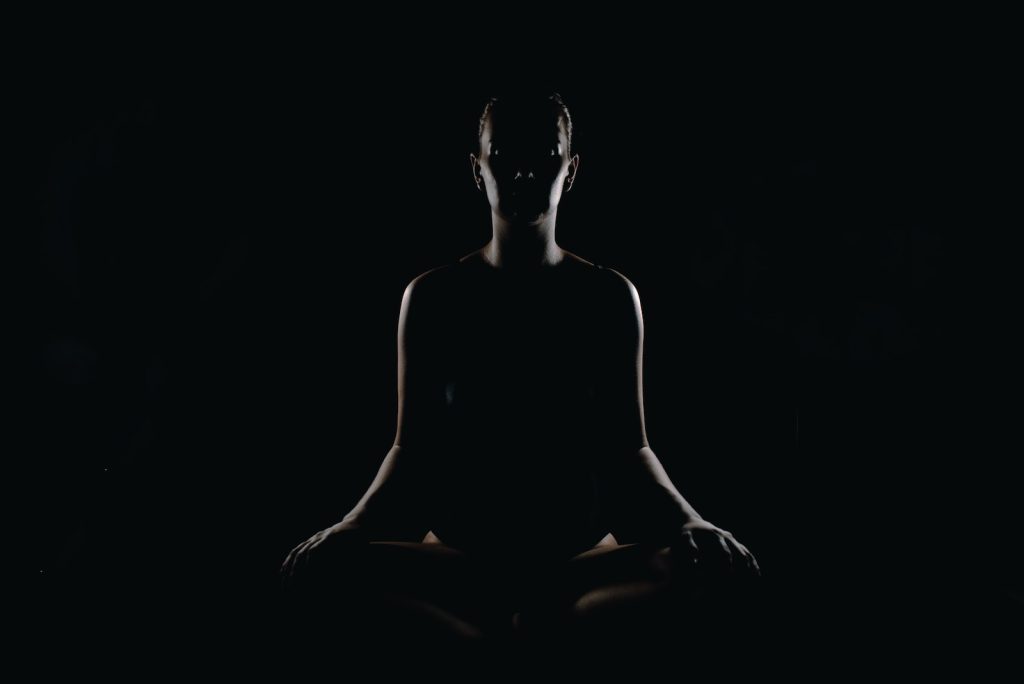Many people struggle to fall asleep at night due to stress, anxiety, or racing thoughts. Fortunately, meditation can be a helpful tool to calm the mind and prepare for a restful night’s sleep. There are many different types of meditations that can be practiced before bed, each with their own benefits and techniques.

One popular type of meditation for sleep is mindfulness meditation. This involves focusing on the present moment and observing thoughts and sensations without judgment. By practicing mindfulness before bed, individuals can let go of any worries or stressors from the day and enter a state of relaxation. Another effective meditation for sleep is guided meditation, which involves listening to a recorded meditation that walks the listener through a series of relaxation techniques. This can be helpful for individuals who have trouble quieting their mind on their own.
Additionally, body scan meditation can be useful for promoting relaxation before bed. This involves slowly scanning the body from head to toe, focusing on each body part and releasing any tension or discomfort. By practicing these types of meditations before bed, individuals can improve their sleep quality and wake up feeling more rested and rejuvenated.
Understanding Meditation and Sleep

The Science of Meditation and Sleep
Meditation is a practice that has been used for centuries to promote relaxation, reduce stress, and improve overall well-being. When it comes to sleep, meditation can be an effective tool to help calm the mind and promote restful sleep.
Research has shown that meditation can help reduce the activity of the sympathetic nervous system, which is responsible for the body’s “fight or flight” response. By reducing this activity, meditation can help lower heart rate, blood pressure, and cortisol levels, all of which can contribute to a more relaxed state conducive to sleep.
Moreover, meditation has been found to increase the activity of the parasympathetic nervous system, which is responsible for the body’s “rest and digest” response. This can help promote feelings of relaxation and calmness, which can be helpful for falling asleep and staying asleep.
Benefits of Meditation Before Bed
Meditation before bed can have several benefits for sleep. Firstly, it can help calm the mind and reduce racing thoughts, which can be a common cause of insomnia. By focusing on the present moment and letting go of worries and distractions, meditation can help create a more peaceful state of mind that is conducive to sleep.
Secondly, meditation can help promote relaxation and reduce physical tension in the body. By practicing deep breathing and progressive muscle relaxation, meditation can help release tension in the muscles and promote a feeling of physical calmness.
Lastly, meditation can help improve overall sleep quality. By promoting relaxation and reducing stress, meditation can help improve the duration and quality of sleep, leading to increased feelings of restfulness and rejuvenation upon waking up.
In conclusion, meditation can be a powerful tool to promote restful sleep and improve overall well-being. By understanding the science behind meditation and the benefits of practicing it before bed, individuals can incorporate this practice into their nightly routine to promote better sleep and overall health.
Preparing for Bedtime Meditation
Creating a Conducive Environment
To get the most out of bedtime meditation, it is important to create a conducive environment that will help you relax and focus. Here are some tips to help you create the perfect environment for meditation:
- Choose a quiet and comfortable space: Find a quiet and comfortable space where you can sit or lie down without any distractions. This could be your bedroom or any other quiet room in your home.
- Set the mood: Dim the lights or light a few candles to create a calming atmosphere. You can also play some soft music or nature sounds to help you relax.
- Remove distractions: Turn off your phone and any other electronic devices that might distract you during meditation.
Choosing the Right Time for Meditation
Choosing the right time for meditation is also crucial for a successful meditation session. Here are some tips to help you choose the right time for bedtime meditation:
- Choose a time when you are relaxed: Bedtime meditation is best done when you are already relaxed and ready for bed. This could be right before you go to bed or after you have completed your bedtime routine.
- Avoid meditation after a heavy meal: It is best to avoid meditation after a heavy meal as it can make you feel uncomfortable and distract you from your meditation practice.
- Stick to a consistent schedule: It is important to stick to a consistent schedule for bedtime meditation. This will help your body and mind get into a routine and prepare for sleep.
By following these tips, you can create a peaceful and relaxing environment that will help you get the most out of your bedtime meditation practice.
Types of Bedtime Meditations
There are several types of meditations that can be practiced before bedtime to promote relaxation and better sleep. Here are some of the most effective types of bedtime meditations:
Guided Imagery
Guided imagery is a type of meditation that involves visualizing a calming scene or situation. This technique can help to relax the mind and body, and reduce stress and anxiety. Guided imagery can be done with the help of a recording or a meditation app, which can guide the listener through the visualization process. Some popular guided imagery themes for bedtime include imagining a peaceful beach, a serene forest, or a warm and cozy bed.
Body Scan Meditation
Body scan meditation is a technique that involves focusing on each part of the body in turn, and paying attention to any sensations that may be present. This technique can help to release tension and promote relaxation, and can be particularly effective for people who carry stress in their bodies. Body scan meditation can be done lying down, and can be guided or done independently.
Mindfulness Meditation
Mindfulness meditation involves paying attention to the present moment, without judgment or distraction. This technique can help to calm the mind and reduce anxiety, and can be particularly effective for people who have trouble falling asleep due to racing thoughts. Mindfulness meditation can be done with the help of a guided meditation app, or independently by focusing on the breath or other sensations in the body.
Deep Breathing Exercises
Deep breathing exercises involve taking slow, deep breaths, and focusing on the sensation of the breath moving in and out of the body. This technique can help to slow down the heart rate, reduce muscle tension, and promote relaxation. Deep breathing exercises can be done lying down, and can be combined with other relaxation techniques such as visualization or progressive muscle relaxation.
In conclusion, practicing meditation before bed can be an effective way to promote relaxation and better sleep. By incorporating guided imagery, body scan meditation, mindfulness meditation, or deep breathing exercises into your bedtime routine, you can help to calm the mind and body, and promote a restful night’s sleep.
Meditation Techniques for Better Sleep
Getting good quality sleep is essential for overall well-being. Meditation can be a great tool to help you relax and fall asleep faster. Here are three meditation techniques that can help you achieve better sleep:
Progressive Muscle Relaxation
Progressive Muscle Relaxation involves tensing and relaxing each muscle group in the body, starting from the toes and working up to the head. This technique can help release tension and relax the body, making it easier to fall asleep.
To practice this technique, start by lying down in a comfortable position. Tense the muscles in your toes and hold for a few seconds, then relax them completely. Move on to the next muscle group, tensing and relaxing as you go up the body.
Visualisation Techniques
Visualisation Techniques involve creating a peaceful and calming mental image to help you relax. This technique can be particularly helpful for those who have trouble quieting their mind before bed.
To practice this technique, start by lying down in a comfortable position. Close your eyes and imagine a peaceful scene, such as a beach or a forest. Visualize yourself in this scene and focus on the details, such as the sound of the waves or the rustling of leaves.
Mantra Repetition
Mantra Repetition involves repeating a word or phrase to help focus the mind and calm the body. This technique can be particularly helpful for those who struggle with racing thoughts before bed.
To practice this technique, start by lying down in a comfortable position. Choose a word or phrase that has personal meaning to you, such as “peace” or “calm”. Repeat this word or phrase silently in your mind, focusing on the sound and rhythm of the repetition.
Overall, meditation can be a useful tool for achieving better sleep. These techniques can be practiced individually or in combination to find what works best for you. Remember to be patient and consistent with your practice, and you may find that you are able to achieve better quality sleep.
Common Challenges and Solutions
Dealing with Distractions
Meditating before bed can be challenging, especially when there are distractions in the environment. Common distractions include noise, light, and thoughts. One way to deal with distractions is to create a peaceful environment. This can be achieved by turning off electronic devices, using earplugs or white noise machines, and dimming the lights.
Another way to deal with distractions is to acknowledge them and let them go. When a thought or noise enters the mind, simply observe it without judgment and return the focus to the breath. With practice, the mind will become less reactive to distractions.
Managing Expectations
It is important to manage expectations when meditating before bed. Some nights, the mind may be too active to achieve a deep state of relaxation. This is normal and should not be a cause for frustration. Instead, focus on the process of meditation and the benefits it provides.
Setting realistic goals can also help manage expectations. For example, starting with a five-minute meditation and gradually increasing the time can help build a consistent practice without overwhelming the mind.
Overcoming Sleep Anxiety
For some individuals, the thought of not being able to fall asleep can cause anxiety. Meditation can be a helpful tool for overcoming sleep anxiety. By focusing on the breath and letting go of thoughts, the mind can become more relaxed and less prone to worry.
Guided meditations specifically designed for sleep can also be helpful. These meditations often include calming music and soothing imagery to help the mind and body relax.
Overall, meditation before bed can be a helpful tool for promoting relaxation and better sleep. By acknowledging and addressing common challenges, individuals can build a consistent practice and reap the benefits of meditation.
Integrating Meditation into Your Nightly Routine
Consistency is Key
In order to reap the benefits of meditation, it is important to make it a consistent part of your nightly routine. This means setting aside a specific time each night to practice meditation, whether it be right before bed or earlier in the evening. By making meditation a regular habit, it becomes easier to stick to and can help establish a sense of calm and relaxation before sleep.
Tracking Progress and Adjustments
As with any habit, it can be helpful to track progress and make adjustments as needed. Consider keeping a journal or log of your meditation practice, noting any changes in sleep patterns or overall well-being. This can help identify any areas that may need improvement, such as adjusting the timing or length of your meditation sessions.
It is important to remember that meditation is a personal practice and what works for one person may not work for another. Experiment with different techniques and styles of meditation to find what works best for you and your nightly routine. With consistency and a willingness to make adjustments, integrating meditation into your nightly routine can be a powerful tool for promoting relaxation and restful sleep.
Advanced Tips for Experienced Meditators
For experienced meditators, the goal is to deepen their practice and achieve a higher level of consciousness. Here are some advanced tips that can help experienced meditators enhance their meditation practice:
1. Experiment with Different Meditation Techniques
Experienced meditators should experiment with different meditation techniques to find the one that works best for them. They can try different types of meditation such as mindfulness, loving-kindness, or body scan meditation. They can also experiment with different meditation positions such as sitting, standing, or lying down.
2. Set Intentions for Your Meditation Practice
Setting intentions before meditation can help experienced meditators focus their minds and achieve their goals. They can set intentions such as reducing stress, increasing self-awareness, or cultivating compassion. It is important to set realistic intentions and focus on them during the meditation practice.
3. Use Props to Enhance Your Meditation Practice
Experienced meditators can use props such as cushions, blankets, or eye masks to enhance their meditation practice. Cushions can help them sit comfortably and maintain good posture. Blankets can keep them warm and comfortable during meditation. Eye masks can block out light and help them focus on their breath.
4. Practice Meditation Before Bed
Meditating before bed can help experienced meditators relax and prepare for sleep. They can try different meditation techniques such as body scan meditation or progressive relaxation. They can also use guided meditation apps or recordings to help them fall asleep.
5. Practice Meditation Regularly
Experienced meditators should practice meditation regularly to maintain their practice and achieve their goals. They can set a regular meditation schedule and stick to it. They can also join a meditation group or attend a meditation retreat to deepen their practice and connect with other meditators.
By following these advanced tips, experienced meditators can enhance their meditation practice and achieve a higher level of consciousness.
Resources and Further Reading
For those interested in learning more about meditations before bed, there are many resources available online. Here are a few recommended articles and websites:
- “Sleep Meditation: What It Is, Benefits and How To Do It” by Dr. Young on Healthline: This article provides a clear explanation of what sleep meditation is, how it works, and its many benefits. It also includes tips for getting started with sleep meditation.
- “How to Meditate Before Bed: 5 Proven Techniques” by Amber Murphy on Declutter The Mind: This article provides five proven techniques for meditating before bed, including breathing exercises and visualization.
- “Meditation for Sleep: How to Use Meditation for Insomnia, Better Sleep” on WebMD: This article provides an overview of how meditation can be used to improve sleep, including tips for getting started and common mistakes to avoid.
- “Easing Into Sleep With A 20-Minute Meditation” on Mindful: This article provides a step-by-step guide for a 20-minute meditation that can be done before bed, including tips for finding a comfortable posture and focusing on the breath.
In addition to these articles, there are many meditation apps that offer guided meditations specifically designed for sleep. Some popular options include Headspace, Calm, and Insight Timer. These apps often offer free trials or free content, making it easy to try out different meditations before committing to a subscription.
Overall, there are many resources available for those interested in incorporating meditation into their bedtime routine. With a little practice and patience, meditation can be a powerful tool for improving sleep and reducing stress.




